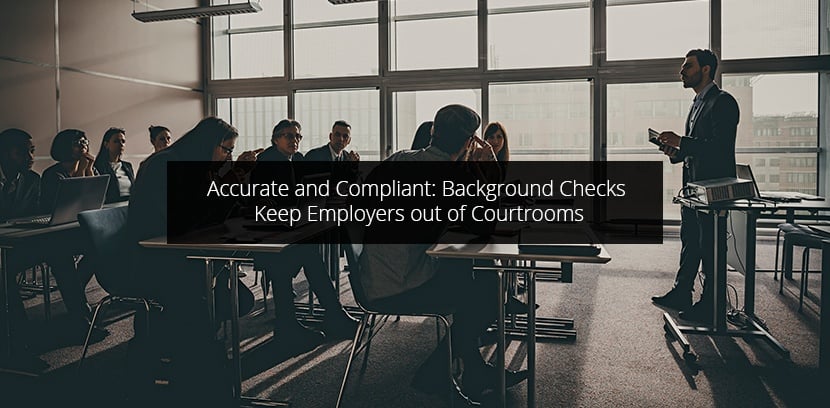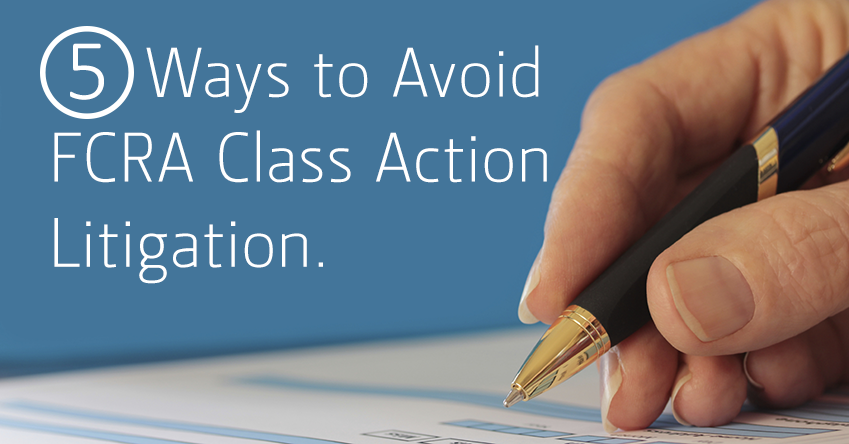Could your business be at risk for an FCRA Lawsuit?

Class action lawsuits involving employers and possible violations of the Fair Credit Reporting Act (FCRA) can shake up human resource professionals. Of course no one intentionally violates federal (or state) regulations. Hiring managers hope to do what's best by their employers - hiring the right people for the right jobs. Because of the complexity of regulations and other compliance challenges, many employers are unknowingly putting themselves at risk for an FCRA lawsuit.
Could your business be at risk for a lawsuit?
FCRA Lawsuits in the News
Southeastern Pennsylvania Transportation Authority (SEPTA)'s background screening processes were put under scrutiny in late April when an FCRA lawsuit claimed that they didn't provide clear disclosure that they would be performing applicant background checks. The lawsuit also claims that they violated Pennsylvania's Criminal History Record Information Act by rejecting applicants based on non-job-related crimes in criminal background checks.
Lowe's Home Improvement is also currently fighting an FCRA class action lawsuit about the same disclosure form, with plaintiffs complaining of additional and confusing language other than disclosing the use of background checks.
Whole Foods also settled a lawsuit in late 2015 for violating the FCRA with employees claiming that they were unaware they were consenting to background checks when they signed the disclosure form.
Are you noticing a pattern?
In other news, an FCRA class action lawsuit against the retailer Target was recently dismissed by a federal judge. The plaintiff claimed that Target's disclosure and authorization for a background check contained extraneous information meant to confuse job applicants.
Last week, the U.S. Supreme Court ruled that plaintiffs must provide proof of "concrete and particularized" injury when bringing forth class action lawsuits related to FCRA violations. This ruling was after Thomas Robins accused internet website Spokeo of falsely reporting information about him. The judges stated that in order for false information to be considered injury, it must cause a true risk of harm to the person in some individual way. This most recent ruling may affect other plaintiffs looking to file a class action lawsuit related to the FCRA, as the burden of proof is now more of a challenge.
How to Avoid an FCRA Lawsuit
At VeriFirst Background Screening, we write every week about compliance including EEOC and FCRA. Since background screening is what we do, our clients depend on us to help them make the right employment decisions. We've found, in over a decade of background screening, that the most common FCRA violations are related to background check disclosure forms during the hiring process. Adverse action notices are also tricky, and if not executed properly, could also put your business at risk for an FCRA lawsuit.
Background Check Disclosure Forms: Applicants and employees must be notified if their employer will be conducting a background screening. This disclosure and consent to a background check must be a "clear and conspicuous" stand-alone document, meaning that it is separate from the employment application.
Employers are to notify the applicant that the background checks will be used to determine the hiring decision. The disclosure form must not contain any other information except for:
- Name
- Address
- Date of birth
- Social Security number (if required for the background check)
- List of types of background checks that will be performed
- Signature line
- Date line
Adverse Action Notices: Adverse action is applied if the employer recognizes activity on a background check that would contribute to an adverse decision (no hire, no promotion, or termination, as an example). The applicant or employee must be notified of the background check findings so they will have a chance to dispute them or explain. If there are no disputes, the applicant or employee must then be notified of the adverse action and the findings that lead to the decision.
For more details: Denying Employment: An Adverse Action Guide
Align with an FCRA Compliant partner: When using a third party professional background screening company, businesses should align with an FCRA certified partner. VeriFirst Background Screening has FCRA-certified and trained staff to help organizations with hiring processes, compliance and hiring decisions. We do our best to stay abreast of federal and state regulations and partner with our clients to help clarify what could be very complex screening or hiring procedures.
With FCRA lawsuits on the rise and with the recent Supreme Court decision, some litigation may be on standstill or could go to the highest courts in the land. Organizations must have an understanding of the challenges that some businesses face when their hiring practices are under scrutiny during a lawsuit. The risk can be avoided by reviewing and revamping your hiring processes and forms now. Let us know if we can help.
Share this
You May Also Like
These Related Stories

Accurate and Compliant: Background Checks Keep Employers out of Courtrooms

5 Ways to Avoid FCRA Class Action Litigation

